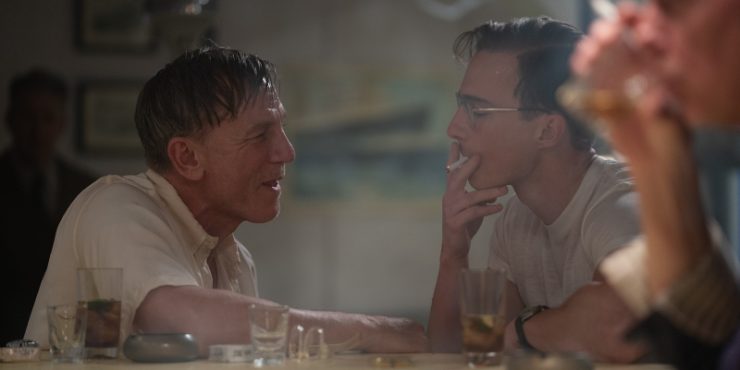Perhaps more than any other director working right now, Luca Guadagnino understands that fucking is one of humanity’s greatest motivators, dictating nearly every aspect of our lives, it’s consequences rippling forever through our relationships, our work, our homes. His movies are frank, often overindulgent, but never crude. Earlier this year, he released Challengers, a paced sports dramedy about a love triangle. That film was written by Justin Kuritzkes, as is Queer, the second Guadagnino film of 2024. Where Challengers was amped, Queer is subdued. Challengers was about the flittering passion of youth. Queer is about the indignity of searching for love in your fifties. Based on the William S. Burroughs novella, Queer does have something of the Beat sensibility in it, but Kuritzkes manages to adapt it into something stunningly modern.
Daniel Craig plays Bill Lee, a lonely heroin addict living in post-war Mexico City. He spends his days and nights frequenting bars, lustily searching for young men to fulfill his erotic desires. He’s not above paying for it if he strikes out in the field. When he sees Eugene Allerton (Drew Starkey) playing chess with a young woman, he’s instantly smitten. He’s then burdened by the ultimate question: is he queer? Getting this question wrong could have dire consequences, so he asks around. His friend, Joe (Jason Schwartzman, in a Ginsberg-ian performance), has no intel, but he’s also no stranger to taking the wrong man home. All’s fair in the pursuit of life’s eternal pleasures. Bill finally initiates a conversation with Eugene, whose cool, detached beauty draws him in, even as the young man refuses to make an emotional commitment.
They begin an affair even though Eugene makes it clear that he has no interest in exclusivity or entanglement. He still plays chess with the young woman, barely acknowledges Bill in mixed company. This makes the already insecure Bill blind with jealousy and resentfulness. He sinks deeper into his booze and drugs, embarrasses himself in front of friends. Eventually, Bill convinces Eugene to join him on a trip to Ecuador in search of a powerful new drug called “yagé”. It’s said to heighten the senses, alter the mind, make telepathy possible. The two men find a shack in the middle of the rain forest, where a mad doctor (Lesley Manville, a total hoot) wields a pistol and yells about the importance of her “research”. She gives them the “yagé” – or ayuasca – which sends Bill and Eugene on the most sincere drug trip in movie history.
If the film’s first ninety minutes – romantic but strange, ethereal, and unrepentantly horny – doesn’t turn off the audience, then it’s final forty-five might. This distended sequence in the jungle is not only surreal, but unwieldy. Meditative interiority becomes broad farce. Manville arrives with black teeth, a receding hairline, and no eyebrows. One’s patience may meet its end. I can see why Queer alienated many after its festival run earlier this Fall. If one is expecting a film like Luca’s Call Me By Your Name, seeing this could be more than a small surprise. Queer feels openly hostile to that earlier film’s sensitivity, a lurid rebuttal in which Guadagnino makes the case that not all queer romance must fulfill its narrative necessities. I find Queer to be a beautiful, if decadent, story of isolation and self-consciousness, a hopeless journey in search of connection.
That overwhelming sincerity, so unique to Guadagnino, is what separates him from his peers, and often what keeps his films from being truly great. The same way that a tennis ball POV shot in Challengers is both what makes it fascinating and what makes it arch. His characters are lustful and wear their hearts on their sleeves. The yearning is refreshing in a Hollywood era that sustains itself on irony. The seeming rejection of Queer is likely a grasp toward the more winking provocation of Challengers, which – it should be said – is the better film of the two. But I genuinely like that Guadagnino’s stories feel like a raw nerve, and see no problem with earnestly exploring the visual possibilities of a broken heart or an aching affection. One day, he may perfect the balance, but even if he doesn’t, his films are remarkable documents nonetheless.
If you’ve ever seen Daniel Craig in anything other than a James Bond film, you already knew that he’s an actor desperate to defy expectations and test the limits of his screen persona. This was true even before he was Bond. Consider his version of Perry Smith in the other Truman Capote movie of the mid-2000s, Infamous. Given the opportunity, Craig can play rather outsized. His American accent seems to always come out as parody. Some of the riskier choices he’s made in his career lack subtlety. This is all partly true in his Queer performance as well, which leans heavily on twitchy mannerisms, but Craig does have moments of great depth. Sure, he commits to the physicality of the sex scenes, but so too does he recreate the anguish and isolation.
The film and the performance owes more to Burroughs than I’d imagine the film’s marketing wants you to comprehend. Kuritzkes offers allusions to the writer’s notorious life in the script, and how it colors a famously inscrutable novella. Queer is not hard to follow, and despite its many flourishes, I don’t think its art house qualities disqualify it from being appreciated by a more mainstream audience. It’s Guadagnino’s fervent style, along with Sayombhu Mukdeeprom’s gorgeous cinematography, that makes this movie worthwhile. Meanwhile, the script cuts to the quick of addiction, for drugs, for love, for life’s ultimate high. Guadagnino’s movies are all about fucking, yes. But they’re also about the painful realities of the human condition. The cost and the fallout. Queer‘s ending, seeped in metaphor as it is, hits hard in its stark clarity. There ain’t no cure for love.
Directed by Luca Guadagnino










